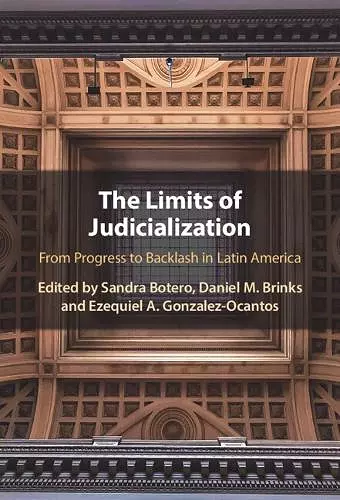The Limits of Judicialization
From Progress to Backlash in Latin America
Daniel M Brinks editor Ezequiel A Gonzalez-Ocantos editor Sandra Botero editor
Format:Hardback
Publisher:Cambridge University Press
Published:25th Aug '22
Currently unavailable, and unfortunately no date known when it will be back
This hardback is available in another edition too:
- Paperback£29.99(9781009096164)

Utilizing case studies of seven Latin American countries, this book reassesses the role of legal institutions in the politics of the region.
Focusing on several hot-button topics in Latin American politics, including abortion, state violence, judicial corruption and corruption prosecutions, The Limits of Judicialization explains why the institutional and cultural changes that empowered the region's courts often fall short of the promise of greater accountability and rights protection.Latin America was one of the earliest and most enthusiastic adopters of what has come to be known as the judicialization of politics - the use of law and legal institutions as tools of social contestation to curb the abuse of power in government, resolve policy disputes, and enforce and expand civil, political, and socio-economic rights. Almost forty years into this experiment, The Limits of Judicialization brings together a cross-disciplinary group of scholars to assess the role that law and courts play in Latin American politics. Featuring studies of hot-button topics including abortion, state violence, judicial corruption, and corruption prosecutions, this volume argues that the institutional and cultural changes that empowered courts, what the editors call the 'judicialization superstructure,' often fall short of the promise of greater accountability and rights protection. Illustrative and expansive, this volume offers a truly interdisciplinary analysis of the limits of judicialized politics.
“The Limits of Judicialization pushes the boundaries of the field. It is a seminal contribution to the study of judicial politics in comparative perspective, and an essential read for anyone interested in courts in Latin America, including graduate students, scholars, and practitioners. It engages masterfully with existing research and opens new and fruitful avenues for future work in the region and beyond.” Raul Sanchez-Urribarri, Senior Lecturer in Crime, Justice and Legal Studies, La Trobe University, Melbourne
“Illuminating how a 'superstructure of judicialization' propelled courts into politics in Latin America, this extraordinary volume examines the results, and indeed limitations, of judicial involvement in public policy and political disputes in the region. Through a rich cross-disciplinary, cross-regional dialogue, contributors' portraits reveal how institutional weakness and entrenched interests compromise courts' ability to enliven progressive promises and punish public misconduct.” Diana Kapiszewski, Distinguished Associate Professor of Government, Georgetown University
“Constitutional reform across Latin America in the late 20th century created new judicial pathways for addressing social and institutional challenges at the heart of the democratization project. This essential collection of essays from leading scholars illuminates the political challenges that the region's courts inherited as they attempted to carry out their new roles as well as several unintended consequences of judicializing politics.” Jeffrey K. Staton, Professor of Political Science, Emory University
“The Limits of Judicialization explains why the judicialization of politics failed to guarantee greater rights protection and signals key factors for understanding the role of courts in authoritarian regression. The combination of new empirical data and rigorous theory make this a particularly useful book for the classroom.” Rachel Sieder, Senior Research Professor, Center for Research and Graduate Studies in Social Anthropology (CIESAS), Mexico City
ISBN: 9781009098342
Dimensions: 236mm x 158mm x 27mm
Weight: 698g
350 pages